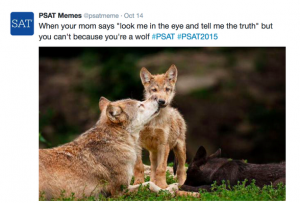Challenge accepted
Popular internet trends can create risks.
The world of viral internet challenges has overtaken Instagram and YouTube, as social media users circulate new fads each year, but some trends can put participants at serious health risks.
Junior Sofia Pirri participated in the cinnamon challenge, a fad that peaked in 2012 and requires participants to eat a spoonful of cinnamon under 60 seconds without drinking liquid. Pirri did the challenge in sixth grade, but says she regrets it because it was painful.
“When you’re in sixth grade, you get tagged and you’re just wanting to do something funny and stupid on the internet,” Pirri said.
United States poison control centers received nearly 200 calls as a result of the challenge, and participants risk gagging and choking, according to Cleveland Clinic.
“You take a huge spoonful of [cinnamon], and you think you’re gonna die because your throat is burning, everything hurts,” Pirri said as she fanned her mouth. “You just get stuck there.”
Sophomore Jade Despanie, who also took part in the challenge, said she did because it was a popular thing to do and a way to keep up with the trend. However, like Pirri, she said she would not do it again.
While the cinnamon challenge involved an edible substance, the so-called Tide pod challenge, which hit the internet in January, involves individuals consuming capsules of laundry detergent.
School counselor Annie Egan says that a trend like this is peer pressure at its worst.
“There are really positive things about a group mentality,” Egan said. “The worst case is something like this — where you start to lose your individual inhibitions because there is this overriding feeling of being justified because lots of people are doing it.”
Egan says some people might do the challenge to fit in or gain respect, but the majority of people do not know why they did it. She recommends individuals reflect on who they are and how they want to be known to bring out their best.
“The more clear you are about what you believe in, the easier it is to make decisions and support them,” Egan said. “If you don’t really know, then it’s pretty easy to get swayed.”
Some internet phenomena are harmless and silly, such as the mannequin challenge, in which participants pose like mannequins as they are filmed by a moving camera to the song “Black Beatles” by Rae Sremmurd, and the invisible box challenge, where participants pretend to step over a nonexistent box.
Other viral challenges take advantage of their platform to generate massive success for a cause.
The ALS ice bucket challenge, in which participants endure a bucket of ice dumped on their heads, raised $115 million in the summer of 2014 towards helping fight amyotrophic lateral sclerosis, according to ALS Association. Despanie and Pirri participated in the challenge, as well as several celebrities, such as Chris Pratt and Oprah Winfrey.
Egan says that the group aspect of internet challenges can be very powerful when individuals feel seen and heard.
“Groups provide connections, and one of the more powerful things one can do as a member is to know themselves well enough so that they are bringing their own individual self,” Egan said. “That’s a really great model of a group.”











